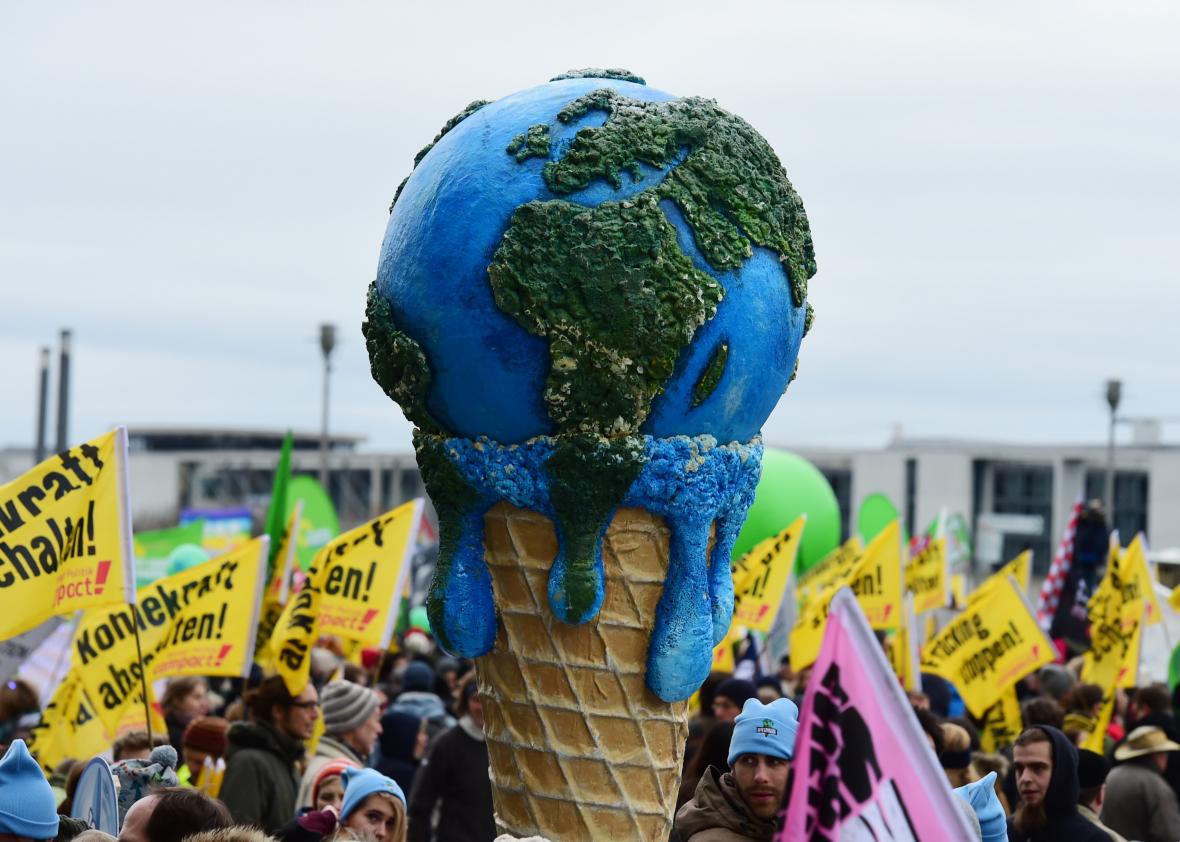Republican presidential hopefuls have used a slew of different ways to say that they either don’t believe in man-made climate change or they don’t believe it enough to do something about it. But in the wake of the historic climate agreement signed by 195 countries this past weekend in Paris, the GOP field appears to prefer a different tack: silence.
As the New York Times noted on Monday, of the nine candidates on CNN’s main stage, only one—John Kasich—was willing to weigh in on the deal when asked over the weekend. The remaining eight will hopefully be pressured to address it tonight, though it’s easy to guess what they think about the deal since we already know where they stand on the underlying issue.
Earlier this year, I broke down the GOP field into five different categories of climate science denialism. (Six if you count the special category I had to create for Scott Walker, a since-departed candidate who routinely refused to answer specific climate science questions—even those from a second-grader.) While that taxonomy still holds, it’s worth regrouping the candidates into two larger sets after the Paris Agreement and ahead of tonight’s debate: The down-players and the deniers.
The Down-Players: John Kasich, Chris Christie, Jeb Bush, Carly Fiorina, Rand Paul
This group concedes that man-made climate change is indeed happening. They are not, however, willing to do anything about it. Their response to the Paris agreement, if they give one, will likely be some punched-up variation of Kasich’s. “While the governor believes that climate change is real and that human activity contributes to it, he has serious concerns with an agreement that the Obama administration deliberately crafted to avoid having to submit it to the Senate for approval,” a spokesman for the Ohio governor in a statement. “That’s an obvious indicator that they expect it to result in significant job loss and inflict further damage to our already sluggish economy.”
The justification this group likes to use is that the nation’s short-term economic concerns should trump the globe’s long-term climate fate, which they don’t think is something we should be all that worried about anyway. As Christie put it on the debate stage back in September: “We shouldn’t be destroying our economy in order to chase some wild left-wing idea that somehow us by ourselves is going to fix the climate.” The position is a convenient one for those candidates trying to appeal to the GOP establishment and their party’s moderates, while still avoiding the fury of the conservative base. It also allows them to sit on their hands while claiming that doing nothing is leadership.
One reason this group has been so slow to weigh in on the Paris agreement is that one of their chief arguments for inaction has long been that the United States can’t solve this problem by itself. “When discussing climate, scientists may agree that some policy change is warranted, but they also agree that action by a single state or nation will make little difference,” as Fiorina said this summer during a falsehood-filled riff on the topic. That argument, though, is undercut both by what happened in Paris and the simple fact that Republicans were so eager to undermine the negotiations in the first place. Jeb, for one, recently suggested if he were president, he might not have even attended the U.N. summit, leaving unsaid how he would convince world leaders to join U.S. efforts if he was unwilling to even meet with them.
The Deniers: Ted Cruz, Donald Trump, Ben Carson, Marco Rubio
This group might be declared the GOP fringe—that is, if it wasn’t made up of the four men at the top of the national GOP polls. Of the group, Rubio is the least vocal and most calculated with his climate science denialism, often wrapping his responses in the same economic-themed language of his establishment rivals. Still, he’s been clear that he doesn’t believe the overwhelming majority of climate scientists: “I do not believe that human activity is causing these dramatic changes to our climate the way these scientists are portraying it,” he said last year.
Meanwhile, Carson’s difficult-to-follow answers on global warming tend to focus on God, while Cruz is more likely to chalk the whole thing up to a liberal conspiracy. During the rollout of his 2016 campaign, the Texas senator dubbed himself a modern-day Galileo while unfairly cherry-picking climate data to try to claim that scientists were cooking the books. (You’ll find a detailed breakdown of the many, many flaws in that argument here.) And Trump? I’ll let the Donald speak for himself: “You want to have clean air. You want to have clean water. That’s very important to me, and I’ve won many environmental awards. I am not a believer in climate change.”
